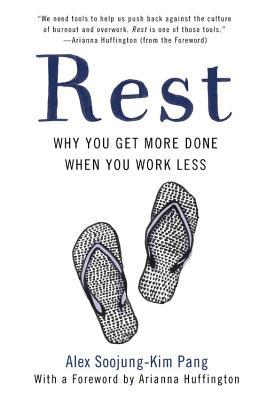
Rest
Why You Get More Done When You Work Less
کتاب های مرتبط
- اطلاعات
- نقد و بررسی
- دیدگاه کاربران
نقد و بررسی

September 26, 2016
Americans live in a strung-out, always-on, overstimulated culture—but this isn’t the way to get good work done, says business consultant Pang (The Distraction Addiction). He recommends seeing work and rest as partners, not polar opposites, and allowing for more rest and downtime. “Over the course of a life,” he coaches, “deliberate rest restores your energy, gives you more time, helps you do more, and helps you focus on doing the things that matter most while avoiding those that don’t.” Sound familiar? To most business and leadership readers, it probably will; Pang’s earnest take on the essential function of rest in a hyper-connected society doesn’t break much new ground. He presents lessons from a sabbatical he took with his wife, and backs up his prescriptions (structured days, walks, naps, sleep, and “deep play”) with tales of how the great minds of history approached the work-rest balance. It’s undeniable that modern office workers are overworked and overstimulated, doing more commuting and housework than ever before while checking email until midnight, but this is a problem whose solution has been sought in dozens of books before this one, and Pang’s approach is far from novel. Agent: Zoë Pagnamenta, Zoë Pagnamenta Agency.

October 1, 2016
Why being a workaholic is not the key to greater productivity.When we stop and rest properly, were not paying a tax on creativity. Were investing in it, writes Pang (The Distraction Addiction: Getting the Information You Need and the Communication You Want, Without Enraging Your Family, Annoying Your Colleagues, and Destroying Your Soul, 2013, etc.). While he is by no means the first to recognize this, the workaholic ethos is still dominant in our culture, to the detriment of our health and personal well-being. Here, the author integrates the latest findings from neuropsychologye.g., a Dutch study that showed how allowing the mind to wander while performing a demanding task actually improved student performance. Pang suggests that Malcolm Gladwells influential thesis in his often cited book Outliers is incomplete. While not disagreeing with Gladwells contention that world-class performers will have clocked at least 10,000 practice hours, Pang contends that 12,500 hours of deliberate rest and 30,000 hours of sleep were also necessary. This is not only because rest and sleep are vital to our health, but they also give the mind the opportunity to work on problems offline. While we sleep, memory consolidation takes place. As brain scans have demonstrated, taking a break from a demanding task frees the mind to wander productively. Many creative people accomplish this by walking or napping. Surprisingly, for Winston Churchill, a midafternoon nap was an inflexible part of his routine, even at the height of World War II. Pang decries the modern tendency of people in high-powered jobs to work 24/7, taking work home with them and delaying or foregoing vacations. Not only is this detrimental to family relationships, it actually decreases productivity. Pang also warns that while child-rearing or volunteering are important activities, we also need personal time and space. A useful holiday gift at a time when New Years resolutions will be on the agenda.
COPYRIGHT(2016) Kirkus Reviews, ALL RIGHTS RESERVED.

























دیدگاه کاربران